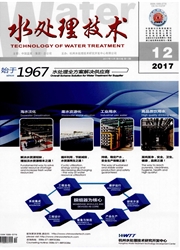

 中文摘要:
中文摘要:
以筛选出能够高效降解焦化废水的更多种细菌为目的,应用了几种方法培养细菌,并对其降解效果和培养因素做了分析。通过2种培养基分离土著菌的效果比较,选择了一种焦化废水与营养物质混合配制的培养基,分离出的细菌中有20株对焦化废水的COD降解率在40%以上,且菌种具有一定的多样性。通过驯化的非土著菌对焦化废水的降解较差。用毒性物质驯化的焦化废水活性污泥,对COD的降解率提高了10%左右。某种菌剂比从其中分离的单株菌对焦化废水COD的降解率高35%左右。5株土著兼性菌的复合比单株菌对焦化废水COD的降解率高出20%。
 英文摘要:
英文摘要:
In order to screen out efficient bacteria which could degraded coking wastewater, several methods wereused for culturing bacteria and the effect of degradation and the factors of culture were discussed, coking wastewater mixed with nutrients were selected for isolation medium to examined the effect of pure culture of two media. There were 20 isolated strains which had a good COD degradation rate, more than 40%, and the isolates had certain biodiversity. The effect of the domesticated non-indigenous bacteria degraded coking was poorer than that of the indigenous bacteria. Use toxic substances to domesticated coking wastewater activated sludge; the degradation rate of COD increased about 10%. Microbial inoculants are about 35% higher than single strain which screened from it on COD degradation rate of coking wastewater. The complex microbial inoculants assembled by 5 strains indigenous bacteria was 20% higher than single strain on COD degradation rate of coking wastewater.
 同期刊论文项目
同期刊论文项目
 同项目期刊论文
同项目期刊论文
 Experimental study of bubble growth and departure at the tip of capillary tubes with various wettabi
Experimental study of bubble growth and departure at the tip of capillary tubes with various wettabi Visual experiments of bubble growth and departure at the tip of inclined capillary tubes in a stagna
Visual experiments of bubble growth and departure at the tip of inclined capillary tubes in a stagna 期刊信息
期刊信息
